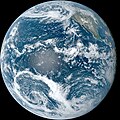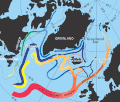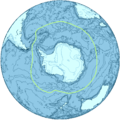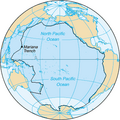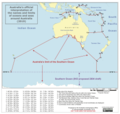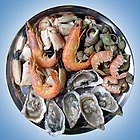Portal:Oceans
– Hover over image and scroll to middle for controls to see more selected panorama images –
Introduction
| Earth's ocean |
|---|
|
Main five oceans division: Further subdivision: Marginal seas |

The ocean is the body of salt water that covers approx. 70.8% of Earth. In English, the term ocean also refers to any of the large bodies of water into which the world ocean is conventionally divided. Distinct names are used to identify five different areas of the ocean: Pacific, Atlantic, Indian, Antarctic/Southern, and Arctic. The ocean contains 97% of Earth's water and is the primary component of Earth's hydrosphere, thus the ocean is essential to life on Earth. The ocean influences climate and weather patterns, the carbon cycle, and the water cycle by acting as a huge heat reservoir. (Full article...)

A sea is a large body of salty water. There are particular seas and the sea. The sea commonly refers to the ocean, the wider body of seawater. Particular seas are either marginal seas, second-order sections of the oceanic sea (e.g. the Mediterranean Sea), or certain large, nearly landlocked bodies of water. (Full article...)
Oceanography (from Ancient Greek ὠκεανός (ōkeanós) 'ocean', and γραφή (graphḗ) 'writing'), also known as oceanology, sea science, ocean science, and marine science, is the scientific study of the oceans. It is an Earth science, which covers a wide range of topics, including ecosystem dynamics; ocean currents, waves, and geophysical fluid dynamics; plate tectonics and seabed geology; and fluxes of various chemical substances and physical properties within the ocean and across its boundaries. These diverse topics reflect multiple disciplines that oceanographers utilize to glean further knowledge of the world ocean, including astronomy, biology, chemistry, geography, geology, hydrology, meteorology and physics. Paleoceanography studies the history of the oceans in the geologic past. An oceanographer is a person who studies many matters concerned with oceans, including marine geology, physics, chemistry, and biology. (Full article...)
Selected article -
The Barents Sea (/ˈbærənts/ BARR-ənts, also US: /ˈbɑːrənts/ BAR-ənts; Norwegian: Barentshavet, Urban East Norwegian: [ˈbɑ̀ːrəntsˌhɑːvə]; Russian: Баренцево море, romanized: Barentsevo More) is a marginal sea of the Arctic Ocean, located off the northern coasts of Norway and Russia and divided between Norwegian and Russian territorial waters. It was known earlier among Russians as the Northern Sea, Pomorsky Sea or Murman Sea ("Norse Sea"); the current name of the sea is after the historical Dutch navigator Willem Barentsz.
The Barents Sea is a rather shallow shelf sea with an average depth of 230 metres (750 ft), and it is an important site for both fishing and hydrocarbon exploration. It is bordered by the Kola Peninsula to the south, the shelf edge towards the Norwegian Sea to the west, the archipelagos of Svalbard to the northwest, Franz Josef Land to the northeast and Novaya Zemlya to the east. The islands of Novaya Zemlya, an extension of the northern end of the Ural Mountains, separate the Barents Sea from the Kara Sea. (Full article...)Interesting facts -
- Ocean Wind, a planned offshore wind farm in the U.S., may use infrastructure at a closed nuclear power plant to access the electrical grid.
- Clover grass used to grow in the Pacific Ocean, but has not been seen there since a severe storm in 1996.
- Bolivia sued Chile in 2013 to regain land lost in 1884, claiming it had an Obligation to Negotiate Access to the Pacific Ocean.
Selected list articles and Marine habitat topics
| Marine habitats |
|---|
| Coastal habitats |
| Ocean surface |
| Open ocean |
| Sea floor |
- List of oceans
- List of ancient oceans
- List of seas
- List of circumnavigations
- List of cruise lines
- List of largest lakes and seas in the Solar System
- List of marine biologists
- List of marine ecoregions
- List of maritime explorers
- List of naval battles
- List of ocean liners
- List of oceanographic institutions and programs
- List of oldest surviving ships
- List of rogue waves
- List of seafood dishes
- List of submarine topographical features
Tasks
 |
Here are some tasks awaiting attention:
|
General images -
Related portals
In the news
- 9 May 2024 – Spillover of the Israel–Hamas war
- Red Sea crisis
- 29 April 2024 – Israel–Hamas war
- Red Sea crisis
- Houthi forces strike four ships in the Red Sea and damage the Malta-flagged, Greece-owned bulk carrier Cyclades. (The Jerusalem Post) (AP)
- 12 April 2024 – Iran–Israel proxy conflict
- Germany tells its citizens to leave Iran immediately, saying that "air, land and sea transport routes" will likely be affected by military action in the region. (Reuters)
- 8 April 2024 – Russian invasion of Ukraine
- Ukraine claims to have damaged the Russian Navy missile ship Serpukhov in the Baltic Sea near Kaliningrad. (Kyiv Independent)









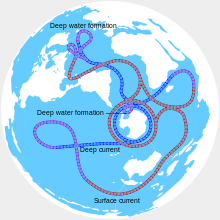



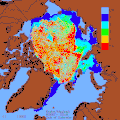



























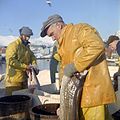




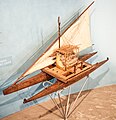






![Image 43"Terres Australes" [sic] label without any charted landmass (from Southern Ocean)](http://upload.wikimedia.org/wikipedia/commons/thumb/8/8e/Geography_world_map.jpeg/120px-Geography_world_map.jpeg)








